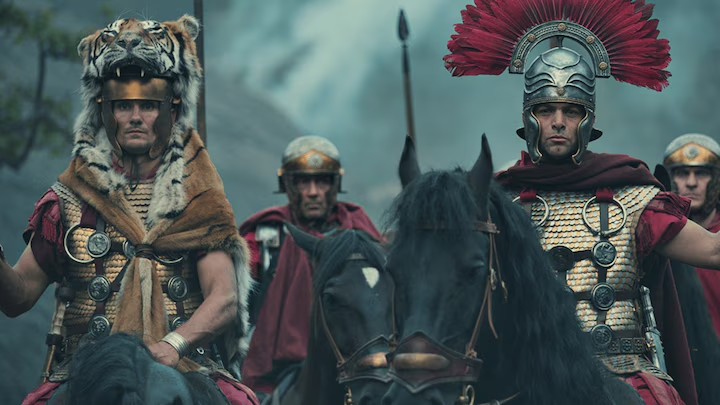
As a fan of historical dramas like Vikings, I was immediately intrigued when I heard about the German series Barbarians. Unlike the typical Roman-centric depictions we’re used to, this show offers a refreshing perspective – one that puts the spotlight on the Germanic tribes and their struggle against the oppressive Roman occupation. With its captivating storytelling, impeccable production values, and a talented ensemble cast, Barbarians has quickly become a must-watch for anyone interested in the ancient world and the clash of civilizations that shaped it.
In this in-depth review, we’ll dive into the key themes, characters, and historical context that make Barbarians such a compelling and thought-provoking series. Whether you’re a fan of the genre or simply looking to expand your understanding of this pivotal moment in history, this blog post will provide a comprehensive analysis that will leave you eager to experience the show for yourself.
Challenging the Roman Narrative: The Perspective of the Oppressed
One of the most striking aspects of Barbarians is its willingness to challenge the traditional narrative surrounding the Roman Empire and its interactions with the Germanic tribes. Instead of portraying the Romans as the heroic, civilizing force, the series presents them as the oppressors, imposing harsh taxes, brutal punishments, and a relentless occupation on the native populations.
This shift in perspective is crucial, as it allows the audience to empathize with the struggles of the Germanic tribes, who have long been relegated to the sidelines of history. By focusing on their experiences, the series humanizes these “barbarians” and gives them a voice, revealing the complex social, political, and cultural dynamics at play during this tumultuous period.
The Varus Battle: A Pivotal Moment in History
At the heart of Barbarians is the Varus Battle, a pivotal moment in history that saw the Germanic tribes, led by the charismatic Arminius, inflict a devastating defeat on the Roman legions under the command of Publius Quinctilius Varus. This event, which took place in the Teutoburg Forest in 9 AD, is widely regarded as one of the most significant military setbacks in Roman history, and it had far-reaching consequences for the empire’s expansion and control over the Germanic territories.
The series does an excellent job of contextualizing the Varus Battle, providing a deep dive into the political, social, and cultural factors that led to the conflict. We see the growing resentment of the Germanic tribes towards the Roman occupation, the internal power struggles within the tribes themselves, and the complex web of alliances and betrayals that ultimately culminated in the fateful battle.
Arminius: The Reluctant Warrior-Turned-Rebel
At the center of Barbarians is the character of Arminius, played with remarkable depth and nuance by Laurence Rupp. Arminius, also known as Hermann, is a complex and multifaceted figure, whose journey from Roman-educated military officer to reluctant leader of the Germanic rebellion is the driving force of the narrative.
Rupp’s portrayal of Arminius is particularly compelling, as he navigates the conflicting loyalties and identities that pull him in different directions. On one hand, Arminius has been immersed in Roman culture and military training, and he has risen through the ranks to become a trusted advisor to the Roman governor. On the other hand, his deep-rooted connection to his Germanic heritage and the plight of his people ultimately compels him to betray the empire and lead the charge against the Roman occupation.
The series does an excellent job of exploring the internal struggles and moral dilemmas that Arminius faces, as he grapples with the consequences of his actions and the weight of the responsibility thrust upon him. This nuanced portrayal of a historical figure helps to humanize the character and make his journey all the more compelling and relatable for the audience.
Powerful Female Characters: Challenging Gender Norms
Another standout aspect of Barbarians is its strong and complex female characters, who defy the traditional gender norms of the time period. Chief among them is Thusnelda, played by the talented Jeanne Goursaud, who is the daughter of a Roman collaborator but harbors a deep resentment towards the occupation and a fierce loyalty to her Germanic roots.
Thusnelda’s character arc is particularly compelling, as she navigates the tensions between her familial obligations and her personal beliefs. She forms a close bond with Arminius, and their relationship becomes a central part of the narrative, adding an emotional depth and complexity to the overall story.
Beyond Thusnelda, the series also features other powerful female characters, such as Folkwin Wolfspeer, played by David Schütter, who is Arminius’ childhood friend and a key figure in the resistance movement. These characters not only challenge the traditional gender roles of the time but also serve as important foils and allies to the male protagonists, adding richness and nuance to the overall narrative.
Historical Accuracy and Production Values
One of the standout features of Barbarians is its commitment to historical accuracy and attention to detail. The series goes to great lengths to recreate the look and feel of the ancient world, from the intricate costumes and set designs to the use of authentic Latin dialogue and the meticulous attention to the cultural and political dynamics of the time period.
The production values of the series are truly impressive, with sweeping battle sequences, stunning cinematography, and a captivating musical score that transports the viewer to the heart of the conflict. The attention to detail extends beyond the visual elements, with the series also delving into the complex political and social structures of the Roman Empire and the Germanic tribes, providing a nuanced and well-researched portrayal of this pivotal moment in history.
A Must-Watch for Fans of Historical Drama
In conclusion, Barbarians is a truly remarkable and compelling series that offers a fresh and thought-provoking perspective on a pivotal moment in history. By shifting the focus away from the traditional Roman-centric narrative and instead highlighting the experiences and struggles of the Germanic tribes, the series provides a nuanced and empathetic portrayal of the complex social, political, and cultural dynamics that shaped this era.
With its captivating storytelling, impeccable production values, and a talented ensemble cast, Barbarians is a must-watch for fans of historical drama and anyone interested in exploring the ancient world from a new and enlightening angle. Whether you’re a seasoned history buff or simply looking for a gripping and immersive viewing experience, this series is sure to leave a lasting impression and inspire further exploration of this fascinating period in time.
Key Takeaways:
Barbarians offers a refreshing perspective by focusing on the experiences and struggles of the Germanic tribes against the oppressive Roman occupation.
The series delves into the complex political, social, and cultural dynamics that led to the Varus Battle, a pivotal moment in history that saw the Germanic tribes inflict a devastating defeat on the Roman legions.
The character of Arminius, played by Laurence Rupp, is a complex and multifaceted figure whose journey from Roman-educated military officer to reluctant leader of the Germanic rebellion is the driving force of the narrative.
The series features strong and complex female characters, such as Thusnelda, who challenge traditional gender norms and serve as important foils and allies to the male protagonists.
The production values of Barbarians are truly impressive, with meticulous attention to historical accuracy and a captivating visual and aural experience that transports the viewer to the heart of the conflict.
Whether you’re a fan of historical dramas or simply looking for a compelling and thought-provoking viewing experience, Barbarians is a series that is not to be missed. So, grab some popcorn, settle in, and prepare to be transported to the ancient world, where the clash of civilizations and the struggle for freedom and identity take center stage.





